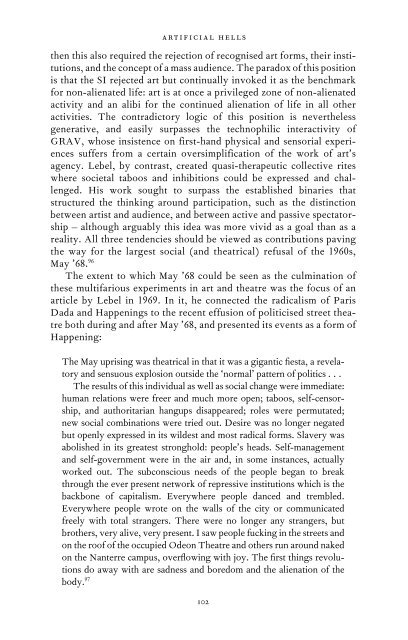Participatory Art and the Politics of Spectatorship - autonomous ...
Participatory Art and the Politics of Spectatorship - autonomous ...
Participatory Art and the Politics of Spectatorship - autonomous ...
Create successful ePaper yourself
Turn your PDF publications into a flip-book with our unique Google optimized e-Paper software.
artificial hells<br />
<strong>the</strong>n this also required <strong>the</strong> rejection <strong>of</strong> recognised art forms, <strong>the</strong>ir institutions,<br />
<strong>and</strong> <strong>the</strong> concept <strong>of</strong> a mass audience. The paradox <strong>of</strong> this position<br />
is that <strong>the</strong> SI rejected art but continually invoked it as <strong>the</strong> benchmark<br />
for non- alienated life: art is at once a privileged zone <strong>of</strong> non- alienated<br />
activity <strong>and</strong> an alibi for <strong>the</strong> continued alienation <strong>of</strong> life in all o<strong>the</strong>r<br />
activities. The contradictory logic <strong>of</strong> this position is never<strong>the</strong>less<br />
generative, <strong>and</strong> easily surpasses <strong>the</strong> technophilic interactivity <strong>of</strong><br />
GRAV, whose insistence on first- h<strong>and</strong> physical <strong>and</strong> sensorial experiences<br />
suffers from a certain oversimplification <strong>of</strong> <strong>the</strong> work <strong>of</strong> art’s<br />
agency. Lebel, by contrast, created quasi- <strong>the</strong>rapeutic collective rites<br />
where societal taboos <strong>and</strong> inhibitions could be expressed <strong>and</strong> challenged.<br />
His work sought to surpass <strong>the</strong> established binaries that<br />
structured <strong>the</strong> thinking around participation, such as <strong>the</strong> distinction<br />
between artist <strong>and</strong> audience, <strong>and</strong> between active <strong>and</strong> passive spectatorship<br />
– although arguably this idea was more vivid as a goal than as a<br />
reality. All three tendencies should be viewed as contributions paving<br />
<strong>the</strong> way for <strong>the</strong> largest social (<strong>and</strong> <strong>the</strong>atrical) refusal <strong>of</strong> <strong>the</strong> 1960s,<br />
May ’68. 96<br />
The extent to which May ’68 could be seen as <strong>the</strong> culmination <strong>of</strong><br />
<strong>the</strong>se multifarious experiments in art <strong>and</strong> <strong>the</strong>atre was <strong>the</strong> focus <strong>of</strong> an<br />
article by Lebel in 1969. In it, he connected <strong>the</strong> radicalism <strong>of</strong> Paris<br />
Dada <strong>and</strong> Happenings to <strong>the</strong> recent effusion <strong>of</strong> politicised street <strong>the</strong>atre<br />
both during <strong>and</strong> after May ’68, <strong>and</strong> presented its events as a form <strong>of</strong><br />
Happening:<br />
The May uprising was <strong>the</strong>atrical in that it was a gigantic fi esta, a revelatory<br />
<strong>and</strong> sensuous explosion outside <strong>the</strong> ‘normal’ pattern <strong>of</strong> politics . . .<br />
The results <strong>of</strong> this individual as well as social change were immediate:<br />
human relations were freer <strong>and</strong> much more open; taboos, self- censorship,<br />
<strong>and</strong> authoritarian hangups disappeared; roles were permutated;<br />
new social combinations were tried out. Desire was no longer negated<br />
but openly expressed in its wildest <strong>and</strong> most radical forms. Slavery was<br />
abolished in its greatest stronghold: people’s heads. Self- management<br />
<strong>and</strong> self- government were in <strong>the</strong> air <strong>and</strong>, in some instances, actually<br />
worked out. The subconscious needs <strong>of</strong> <strong>the</strong> people began to break<br />
through <strong>the</strong> ever present network <strong>of</strong> repressive institutions which is <strong>the</strong><br />
backbone <strong>of</strong> capitalism. Everywhere people danced <strong>and</strong> trembled.<br />
Everywhere people wrote on <strong>the</strong> walls <strong>of</strong> <strong>the</strong> city or communicated<br />
freely with total strangers. There were no longer any strangers, but<br />
bro<strong>the</strong>rs, very alive, very present. I saw people fucking in <strong>the</strong> streets <strong>and</strong><br />
on <strong>the</strong> ro<strong>of</strong> <strong>of</strong> <strong>the</strong> occupied Odeon Theatre <strong>and</strong> o<strong>the</strong>rs run around naked<br />
on <strong>the</strong> Nanterre campus, overfl owing with joy. The fi rst things revolutions<br />
do away with are sadness <strong>and</strong> boredom <strong>and</strong> <strong>the</strong> alienation <strong>of</strong> <strong>the</strong><br />
body. 97<br />
102
















